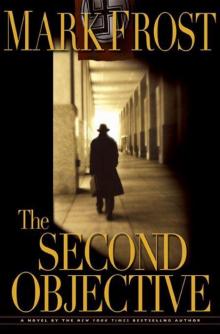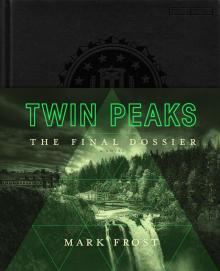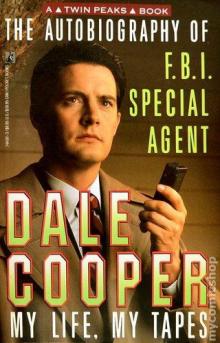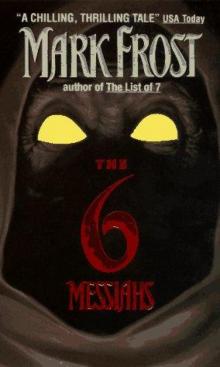- Home
- Mark Frost
Twin Peaks: The Final Dossier Page 7
Twin Peaks: The Final Dossier Read online
Page 7
Word of his “indefinite detention” in Mexico eventually found its way back to the Twin Peaks Sheriff’s Department. With his friend Sheriff Harry Truman along to help sort things out—and, I’ve been told, a few helpful calls placed by a certain Deputy Director of the Bureau—a few months later a Mexican judge cleared James of any involvement in the proceedings, and had him escorted to the border, where he was instructed to leave the country and never return. But an immediate return to Twin Peaks wasn’t in the cards; that court in Oregon still wanted a pound of flesh from James for fleeing its bench warrant. (His abrupt departure from the trial had not in the end deterred the jury from finding the defendants—Evelyn Marsh and the paramour who had been posing as his brother—guilty as charged of murdering her late husband.)
Attorneys and judges put their heads together and decided that for his sins James owed Oregon six months of his life in minimum security followed by two years’ probation, during which time he would not be allowed to leave the state. This weighed heavily on Uncle Ed, who rented an apartment in Portland so he could spend alternate weekends making sure James didn’t succumb to his congenital wanderlust, or step on any other bear traps. With Ed’s steady presence, James satisfied the conditions of his parole, then immediately took to the open road on another Harley. By the time this drama was over and Ed returned home, Nadine had just opened her drapery store in Twin Peaks. It was an immediate, if modest, success, and Ed felt obliged to be supportive as Nadine worked around the clock, which tossed yet another railroad tie on the tracks in front of Ed finally getting together with Norma. Stalemate. Hurley Luck.
A decade passed, as they do. James eventually came back to Twin Peaks, in 2006—this time on a Trailways bus. He’d totaled his Harley in an accident involving a runaway coal truck in West Virginia some months before. Hurley Luck being what it apparently is, he suffered a compound fracture of his leg and ended up flat broke in a county rehab facility. James had edged past thirty, and at this point the bloom faded permanently from his Kerouac romance with the road. Once his leg healed up, he went back to work for Ed at the Gas Farm, and a few years later he took a second job working night security at the Great Northern. He lives alone, modestly, drives a used Ford Focus now, still plays guitar, writes plaintive, simple, and appealing songs—unrequited love, heartbreak, and so on—that he sometimes performs locally, and as far as I can tell has never hurt another human being.
As I pieced together how James Hurley’s life unfolded, this truth they taught at Quantico came back to me, Chief: Just as any criminal can be an accessory to a crime, an entirely innocent person close to an act of violence can become a collateral victim. You can call it Hurley Luck, but this could have happened to anybody; it just seems to me that a part of James died when Laura did, and it has haunted him ever since.
You’ll be pleased to learn that happier outcomes lay in store for a few others in town whom I know you’re fond of. As she soldiered through her troubled private life, Norma Jennings threw all her available energies during these years into the Double R, making it a center of community pride during hard times. When the lumber industry in the valley died and the Packard Mill was shuttered, a lot of people were out of work. She extended credit and reduced prices to families she knew were hurting and made all her excess food available to the homeless. When the economy recovered, Norma took a leap of faith into franchising her beloved eatery—she even briefly dated the big-city slicker from a “comfort food” corporation who wanted to make “Norma’s” a household name in a number of other locations throughout the Pacific Northwest.
This decades-old logjam began to break up late one night when Nadine was doing her books in the back office of Run Silent, Run Drapes. While surfing the Net, she stumbled across an episode of Dr. Amp’s nightly rant. Recognizing her former therapist immediately, she was hooked like a trout. With the unique kind of fervor she could bring to lunatic causes, Nadine soon bought herself a mail-order golden shovel, and a few more for people on her Christmas list. She installed one of the golden shovels like a holy relic in the display window of her drapery store, while embracing the entire Dr. Amp lifestyle: drinking the “Dr. Amp” hemp protein shakes, doing the “Dr. Amp ‘Walking in Nature Program,’“ following his rigorous “Crusade for Political Renewal” by donating to a variety of nonprofit charities he supports. (Taken in its totality, Dr. Amp’s brand, if you will, is one part Amway, one part Anthony Robbins by way of Timothy Leary, one part Grateful Dead.) Nadine’s enthusiasm quickly turned into a kind of religious devotion that appeared to do for her what thirty-odd years of traditional and crackpot therapeutic approaches had failed to achieve: It restored her to a balanced, happy, and functional life.
During one of his weekly nocturnal supply runs, Dr. Jacoby noticed one of his spotlit golden shovels hanging in Nadine’s window. He stopped, knocked on the door, and laid eyes on his former client for the first time in more than two decades. I can’t tell you exactly what they talked about—although rumors suggest they may now be dating—but less than two weeks later, Nadine marched over to the Gas Farm and forthrightly handed Ed his walking papers, the release from obligatory matrimonial bonds he’d long ago given up hoping he would ever receive.
That same day, Big Ed Hurley, pushing seventy, in front of the lunch rush at the Double R Diner, proposed to Norma Jennings, who, it turned out, was just at that moment giving the city slicker and his plans to take “Norma’s” diner corporate the heave-ho. To paraphrase Vince Lombardi, timing isn’t everything, it’s the only thing.
You’ll be pleased to learn, I think, that Ed and Norma got married not long after. James played a song he wrote on his guitar during a civil ceremony conducted by the Big Log near the old train station. All of their friends—half the town, it seems—were there. Andy Brennan bawled more or less throughout, and I’m told even Deputy Chief Hawk got a tear in his eye. His old friend Big Ed’s Hurley Luck had finally turned.
FEDERAL BUREAU OF INVESTIGATION Field Office Criminal Investigative and Administrative Files
As you know, just prior to your arrival back in Twin Peaks, Margaret Coulson—known locally as the Log Lady—passed away after a long battle with lung cancer. In the weeks and days before her death, we learned that she made a significant contribution to the Cooper investigation, one that led to a breakthrough from the Twin Peaks Sheriff’s Department’s side of the case. Her funeral was widely attended—the newspaper said it seemed that the entire town had turned out—on the shores of Pearl Lake. There was no conventional service, but people were invited to speak if they wished to pay tribute, and many, many people got up to share their favorite Log Lady stories.
Deputy Hawk was the last to speak, and he read from a page that he said Margaret had given him the day before she passed. He sent this on to me, and I include the text here:
Every meeting between friends must end with a parting, and so, my friends, today we take our leave. This is life. None of us profits from ignoring or hiding from the facts, so why should we bother? Life is what it is, a gift that is given to us for a time—like a library book—that must eventually be returned. How should we treat this book? If we are able to remember that it is not ours to begin with—one that we’re entrusted with, to care for, to study and learn from—perhaps it would change the way we treat it while it’s in our possession. How do you treat a precious gift from a dear friend? This is a good question to ask, and today is a good time to ask it.
Such busy, busy minds we have. Have you noticed? We think and we think until we twist ourselves into the ground like a flathead screw. My log has this to say: The answers to all our questions are in the wind and the trees, the rocks and the water.
No one is helpless. No one is beyond helping. It is good to seek out those who need us and do what we can for them. I recommend that. There is nothing that can’t be done if we set our minds to doing it. Don’t be sad. Be happy you have another day to do what needs doing. We only have so many of them.
We are born in
to this world, not another one. It’s not perfect, but it is what it is. This world presents some simple, certain truths. It helps us grow if we accept them, but many of these truths seem to trouble or frighten us. For instance, there is no light without darkness—and this troubles many of us—but without it, how else would we tell one from the other? We spend half of every day in darkness; surely we should make our peace with this. You may decide to see this as a metaphor. Many people do. I see it as a fact. Metaphors are beautiful ways of speaking about the truth. So are facts. Both tell us that time—and light, and darkness—moves in cycles. We move through them, too, often as passengers, but if our eyes are open, there is much to be learned along the way. A traveler learns more than a passenger. When darkness comes, a traveler learns to be brave, for they know the light will return. Anyone who’s spent a night alone in the woods learns this.
When a dark age comes, hold the light inside. That’s where it lives anyway. There are forces of darkness—and beings of darkness—and they are real and have always been around us. They’re part of the dance, just as you and I are; they’re just listening to different music. This may be the most troubling truth we will ever know. Many of us live most of our lives and brush up against this reality only rarely. It is far from pleasant, but wishing it were otherwise will not make it so.
So may I offer a suggestion: When a dark age comes, just as you would at night, hold the light inside you. Others, I can tell you, have already learned to do the same. In time, you will learn to recognize the light, in yourself and others. In this way you will find each other. Together, you will make the light stronger.
This truth I know as sure as the dawn: Darkness will always yield to light, when the light is strong.
Margaret asked that her ashes be scattered in the Ghostwood Forest, and so they were later that day by members of the Sheriff’s Department. She left her log to Hawk. He keeps it on his mantel. He reports that it hasn’t said anything to him yet, but he says he’s “keeping an ear open, just in case.”
With all I’ve learned about Twin Peaks, Chief, and all you’ve told me, my only regret is that I never got to meet Margaret. As you know, I don’t consider myself a religious person, but when I read these words of hers, sometimes I think maybe I’ll get my chance someday. (To meet her; not to become religious.)
FEDERAL BUREAU OF INVESTIGATION Field Office Criminal Investigative and Administrative Files
You specifically asked me to find out why Sheriff Harry Truman had left his post, as you discovered upon your return to Twin Peaks. Agent Cooper’s fondness for his friend and former colleague is well established, and the reasons are abundantly clear. Truman was everything a local law enforcement officer should be: sensitive to the needs of his community, protecting and serving in equal measure, modest in word and deed, and as solid and dependable as the sunrise.
In the aftermath of the Palmer case, however, Truman was nearly finished by a defining trauma of his own: his ruinous relationship with the dangerous sociopath Josie Packard. I believe the staunch support Agent Cooper offered his friend after her death helped preserve his sanity, and may well have saved him from self-violence. The sheriff had clearly been damaged by his loss, but not irreparably so: Harry Truman was made of sterner stuff. He’d lived his whole life in Twin Peaks, son of the town’s previous sheriff, as you know. I’ve studied his entire career. While Harry could at many times have smudged the line between extracurricular vigilantism and the strict limits of the law—specifically through the offices of the local “social club” he eventually led, known as the Bookhouse Boys—a closer examination of their history has convinced me that the Boys have always acted in accordance with the spirit of the patriotic home guard Truman’s father founded during World War II. In my opinion, the Bookhouse Boys represent a moral counterweight to the many recent and negative examples we’ve seen of homegrown rural—and so-called libertarian—militias.
As badly hurt as he was by Josie’s betrayal, I believe Harry may have been even more haunted by the sudden disappearance of his friend Cooper. From the records I’ve come across in his files, Harry never abandoned his own investigation into what happened to Cooper—some of those details, pertinent to our own work, are included later in this document—and that for the next twenty-plus years he never gave up on it.
Harry reached retirement age recently, and as you know, the story told around town—that he had turned in his badge for a fishing pole and a seat on the sidelines—was not true. I’ve confirmed that, just as his brother Frank told you on the phone, six months before your return there, Harry had learned he was seriously ill. (I’ve confirmed that it’s cancer, and he’s still living and undergoing treatment in a research hospital near Seattle, but he’s fighting uphill.) Typically private, unwilling to burden anyone with his troubles, Harry kept this news from everyone at the station and in town. His older brother, Frank—who had recently retired after his own long and distinguished career in law enforcement in western Washington—seems to have been the only one he told about his illness, although Hawk, who knew Harry better than anyone, figured it out right away. Frank agreed to move back to Twin Peaks and take the job for two years to help stabilize the department, with the understanding that he would then step down and hand the reins to Hawk.
My sense of this, Chief, is that, given his personal regard for you, if you made the effort to reach out to Harry, he would respond, and be more than grateful to hear from you.
FEDERAL BUREAU OF INVESTIGATION Field Office Criminal Investigative and Administrative Files
So much of what brought us back to Twin Peaks—and ultimately led to our finding Agent Cooper—we clearly owe to Major Garland Briggs. The dossier he compiled and left for us, with its multitude of intriguing leads and frankly incredible tales, is a puzzle we’ll still be reviewing and unraveling for years to come. Among the questions we haven’t settled—even in the aftermath of resolving Cooper’s disappearance—is what exactly happened to Major Briggs himself. Here’s what we know and what I’ve put together about the time line:
We know that the man whom Sheriff Truman found in the sycamore grove after Agent Cooper’s disappearance was not, in fact, Agent Cooper, but his Double.
We know that when Cooper’s Double checked himself out of the hospital the next day, it paid Briggs a visit at his home. We know that Briggs had been expecting a visit from his new Blue Rose “control,” after the death of Doug Milford, and he may have assumed, or even been told, that Agent Cooper was going to be that control. During the Double’s visit, Briggs became alarmed by their interaction and wrote about it in his final entry of the dossier. Given his intuitive capacities, it’s not too great a supposition to assume that Briggs realized, at some point during their meeting, that the man in front of him was not Agent Cooper—and that this was the reason for the Mayday call that he wrote as the last words in the dossier. We can also assume Major Briggs realized that, rather than confront the Double, he’d best keep that realization to himself, but, given what we have since learned about the Double, it’s fair to suppose that it saw through Briggs’s intention.
We know from Mrs. Briggs that, shortly after the Double left their house, Briggs departed for Listening Post Alpha, his classified Blue Rose station up in the mountains. “Mayday protocols” required him to secure—or destroy—all of the secure data contained there, and also stipulated that he disable—or destroy—most of the more advanced and classified technology he’d been using to conduct his study. When Briggs got there, one of two things then happened: Either he successfully enacted those measures and then staged a scene to make it look as if the post had been ransacked—and that he himself had been attacked—or, at some time during his staging, the Double arrived and a genuine and deadly sacking and assault took place.
In either case, given the DNA evidence found at the scene—Briggs’s fingerprints, blood, and tissue—the forensic impressions seemed clear: The post had been breached, during which Briggs had, in all likelihood, been attack
ed. A few days later, when the wreckage of Briggs’s car was found at the bottom of a nearby canyon—with a charred, unidentifiable corpse inside and a few of Briggs’s teeth conveniently placed nearby—death by accident became, as you know, the official conclusion of the investigation. (Reports of the attack were suppressed by our internal investigators, and no suspects were ever publicly identified). It’s clear now that the only reasonable suspect was the Double, and I believe it’s likely he followed Briggs up the mountain to the LPA later that same day. Briggs appears to have conducted such an elaborate deception to fool exactly one person: the Double. That effort appears, at least at the time, to have succeeded.
Given what we have subsequently learned, I believe it’s reasonable to conclude that the scene at the LPA was—for the most part—staged by Briggs and that he subsequently escaped with whatever classified material he could carry with him, which I believe later became the basis for the dossier. A few miles from the outpost, Briggs then staged the crash of his own vehicle, leaving a severely burned corpse inside to complete the illusion and facilitate his escape. If and when the Double arrived at the scene after Briggs had already left, he most likely made his own search of the property, departed with whatever he found, and perhaps set the fire to cover his tracks. I believe it’s less likely, but still possible, that the Double arrived while Briggs was still on-site, but there were sufficient security measures in place that Briggs had ample warning of his approach, giving him enough time to escape before the Double actually got there. (This all remains impossible to determine with 100 percent accuracy.) What, if any, data the Double itself took away from the LPA, we can’t actually know, but if his arrival rushed Briggs’s departure in any way, it’s possible that the Major may have left something pertinent behind.

 Rogue
Rogue The Second Objective
The Second Objective Alliance
Alliance Twin Peaks: The Final Dossier
Twin Peaks: The Final Dossier The Paladin Prophecy
The Paladin Prophecy Game Six: Cincinnati, Boston, and the 1975 World Series: The Triumph of America's Pastime
Game Six: Cincinnati, Boston, and the 1975 World Series: The Triumph of America's Pastime The List of Seven
The List of Seven The Autobiography of FBI Special Agent Dale Cooper
The Autobiography of FBI Special Agent Dale Cooper The Six Messiahs
The Six Messiahs The Secret History of Twin Peaks
The Secret History of Twin Peaks Paladin Prophecy 2: Alliance
Paladin Prophecy 2: Alliance Game Six
Game Six